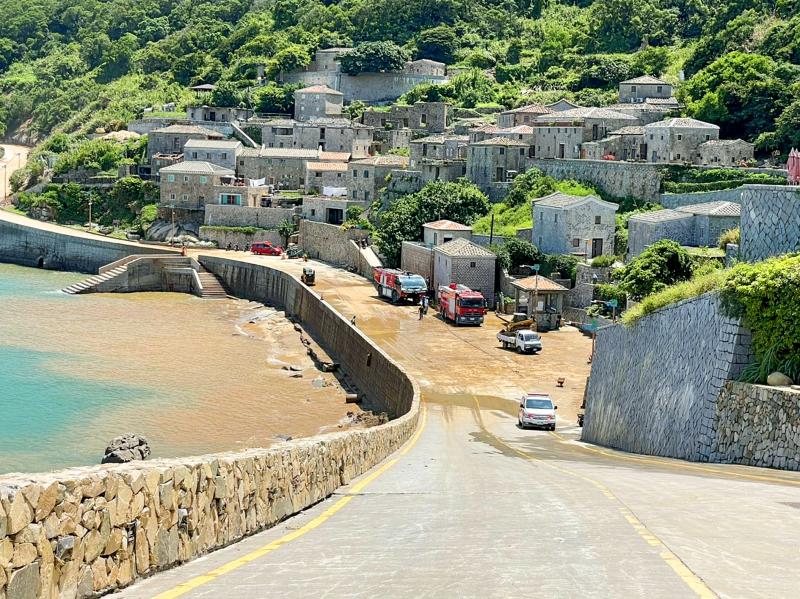Nearly 13 hectares of land in the Matsu Islands are to be set aside for firefly conservation, becoming the first habitat to be preserved for an island insect species.
The decision comes a decade after two new species of firefly were identified by researchers at the Council of Agriculture’s Endemic Species Research Institute.
Led by institute entomologist Ho Jen-zon (何健鎔), the team spent two years studying the species after local residents noted their distinct behavior.

Photo courtesy of Beigan Township
While male fireflies usually emit light to attract females, in the Matsu species, the flightless females emit a steady light while on the ground to attract flighted males, typically between 7pm and 8pm.
The females also use the light as protection, emitting a blinking pattern while crawling or protecting their eggs as a warning to predators.
The team named the first species Rhagophthalmus beigansis after Beigan (北竿), where it is exclusively found. The second, found in Juguang (莒光), was named Rhagophthalmus giallolateralus.
Ho, who passed away in 2018, published the results of the research in the April 2012 issue of Zootaxa.
Only about 200 of the rare fireflies are left in the wild, prompting a collaboration between the Lienchiang County Government and the Forestry Bureau to set up a conservation area on Beigan, Dongju (東莒) and Xiju (西莒) islets.
All fireflies are affected by human encroachment, light pollution and pesticides, but these species are especially vulnerable as they live on the ground, Forestry Bureau Conservation Division Director Shih Chih-ching (石芝菁) said on Saturday.
The county government is therefore taking the initiative to designate a critical habitat to protect the insects, Shih said.
Residents are to be afforded 60 days notice, after which the county government would implement conservation measures, such as restrictions on land use and light pollution, she said.
Conservation areas have historically been established for the benefit of mammals, with few exceptions for insects, most notably the critical habitat designated in 2000 for the broad-tailed swallowtail butterfly, Shih said.
However, the Matsu firefly habitat would be the first to be established for an island-dwelling insect, she said.

Alain Robert, known as the "French Spider-Man," praised Alex Honnold as exceptionally well-prepared after the US climber completed a free solo ascent of Taipei 101 yesterday. Robert said Honnold's ascent of the 508m-tall skyscraper in just more than one-and-a-half hours without using safety ropes or equipment was a remarkable achievement. "This is my life," he said in an interview conducted in French, adding that he liked the feeling of being "on the edge of danger." The 63-year-old Frenchman climbed Taipei 101 using ropes in December 2004, taking about four hours to reach the top. On a one-to-10 scale of difficulty, Robert said Taipei 101

Nipah virus infection is to be officially listed as a category 5 notifiable infectious disease in Taiwan in March, while clinical treatment guidelines are being formulated, the Centers for Disease Control (CDC) said yesterday. With Nipah infections being reported in other countries and considering its relatively high fatality rate, the centers on Jan. 16 announced that it would be listed as a notifiable infectious disease to bolster the nation’s systematic early warning system and increase public awareness, the CDC said. Bangladesh reported four fatal cases last year in separate districts, with three linked to raw date palm sap consumption, CDC Epidemic Intelligence

Taiwanese and US defense groups are collaborating to introduce deployable, semi-autonomous manufacturing systems for drones and components in a boost to the nation’s supply chain resilience. Taiwan’s G-Tech Optroelectronics Corp subsidiary GTOC and the US’ Aerkomm Inc on Friday announced an agreement with fellow US-based Firestorm Lab to adopt the latter’s xCell, a technology featuring 3D printers fitted in 6.1m container units. The systems enable aerial platforms and parts to be produced in high volumes from dispersed nodes capable of rapid redeployment, to minimize the risk of enemy strikes and to meet field requirements, they said. Firestorm chief technology officer Ian Muceus said

MORE FALL: An investigation into one of Xi’s key cronies, part of a broader ‘anti-corruption’ drive, indicates that he might have a deep distrust in the military, an expert said China’s latest military purge underscores systemic risks in its shift from collective leadership to sole rule under Chinese President Xi Jinping (習近平), and could disrupt its chain of command and military capabilities, a national security official said yesterday. If decisionmaking within the Chinese Communist Party has become “irrational” under one-man rule, the Taiwan Strait and the regional situation must be approached with extreme caution, given unforeseen risks, they added. The anonymous official made the remarks as China’s Central Military Commission Vice Chairman Zhang Youxia (張又俠) and Joint Staff Department Chief of Staff Liu Zhenli (劉振立) were reportedly being investigated for suspected “serious